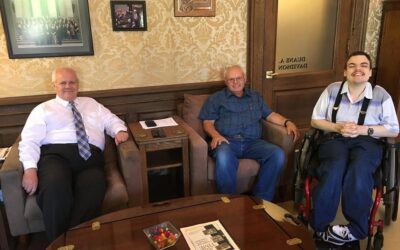The People’s House? Inside the U.S. House of Representatives
By Robert Garrison
American Public University System
Abstract: The U.S. House of Representatives has been called “the People’s House.” However, if the House is to live up to that name, some changes have to be made. There are many areas ripe for reform. Before reform can be discussed however, the following questions should be asked and answered: What is the House’s history as it relates to how it is operated today? What committees does it have and what are their responsibilities? How can the House be more effective and accountable to the people? These questions will be answered in this paper using various books and websites.
I. Statement of Topic (Thesis)
The U.S. House has been called “the People’s House.” In recent years, the House has failed to live up to that name because elected officials have shown that they care more about power than the people that elect them. Therefore, some changes have to be made in order to make the House more accountable to the electorate. The following questions should be asked and answered. What is the House’s history as it relates to how it operates today? What committees does it have and what are their responsibilities? How can the House be more effective and accountable to the people?
II. Presentation of Research
The Beginnings and Current Structure of the House
The concept of having a House of Representatives goes back to the British House of Commons. The U.S. Constitution establishes a House of Representatives (in Article I, Sections I and II) because the Framers wanted the lower house of our bicameral national legislature to be directly elected and accountable to the people. The Constitution originally required the U.S. Senate to be appointed by the state legislatures, but this was changed to direct election of Senators by the Seventeenth Amendment (see Meese, et, al, (2005) pp. 48-50). In summary, the sections provide that members of the House:
- Must be at least 25 years of age.
- Must be citizens of the United States for at least seven years.
- Must be inhabitants of the state that they represent (however they are not required to inhabit the district that they represent.
- The House appoints its own Speaker as presiding officer
- The House is also given “the sole power of impeachment.”
- ”The House is apportioned according to population. After the 1920 census, the number of representatives was fixed at 435 (for a complete discussion of these issues see Meese, et, al, (2005) pp. 53-62).
- According to Article 1, Section 7 of the Constitution “all bills raising revenue (taxes) shall originate in the House of Representatives” (Meese, et, al, (2005) pp. 85-86).
Before a representative can be seated, all 435 members must respond “I do” en masse after the Speaker reads the following oath aloud (Do you) solemnly swear (or affirm) that (you) will support and defend the Constitution of the United States against all enemies, foreign and domestic; that (you) will bear true faith and allegiance to the same; that (you) take this obligation freely, without any mental reservation or purpose of evasion; and that (you) will well and faithfully discharge the duties of the office on which (you are about to enter: So help (you) God” “The current annual salary for representatives is $174,000. The salary for the Speaker is $223,500 and the salary for the Majority and Minority Leaders is $193,400” (House.gov). The Democratic Party currently has the majority in the House with 253 members and 178 Republican members. The House Chamber is not only used for legislative work. It is also the place where the President delivers his State of the Union Messages in front of joint sessions of Congress. Only the President can address Congress in joint sessions, when a foreign dignitary speaks, it is called a joint meeting (Meese, et, al, (2005) pp. 216-217).
A Brief History of the House, its Speakers, etc,
The House has had an illustrious history. 19 of our 44 Presidents have served in the House: Madison, John Quincy Adams, (post-presidency from 1830-1848. He died while in office of a stroke in the Speaker’s Lobby) Jackson, William Henry Harrison, Tyler, (President James K. Polk served as Speaker of the House from 1835-1841. Polk is currently the only President to have served as Speaker of the House) Pierce, Buchannan, Lincoln, Andrew Johnson, Hayes, Garfield, McKinley, Kennedy, Lyndon Johnson, Nixon, Ford (who served as House Minority Leader from 1965-1973) and George H.W. Bush (DeGregorio 2009). Under Article II and the 12th Amendment to the U.S. Constitution, the House is charged with electing the President if there is a tie, or if a candidate receives less than, a 2/3 majority of Electoral College votes (Meese, et, al, (2005), pp. 377-379).The House has chosen the President only twice (in 1800 and 1824). In 1800, candidates Jefferson and Burr were tied. On February 11th, 1801, the House began to vote. On February 17th, after 36 ballots, the House declared Jefferson President and Burr was chosen as Vice-President (Remini, (2006) pp. 70-72). The election of 1800 led directly to the passage of the 12th Amendment to the Constitution which mandated separate balloting for President and Vice-President. In 1824, no one received a majority of the electoral votes. Speaker of the House Henry Clay was also a candidate in that election. Therefore, it was thought that Clay could swing the election his way during the House vote. However, Clay met with candidate John Quincy Adams and agreed to support Adams’ candidacy and Adams was elected. When Adams appointed Clay his Secretary of State, Andrew Jackson “roared his rage…of a corrupt bargain” (Remini, (2006) pp. 114-115).
To understand how the House operates today, two of its most legendary Speakers merit brief mentions. Thomas B. Reed (who served as Speaker from 1889-1891 and then again from 1895-1899) earned the nickname “Czar Reed” because of the dictatorial way he ran the House. Reed once said, “The rules of the House are not for the purpose of protecting the rights of the minority, but to the orderly conduct of the business of the House” (Remini, (2006) p. 246). Reed also said, “It is best for one party to govern and the other party to watch” (Remini, (2006) p. 250). What made House backbenchers so angry, was the fact that Reed devised a new rule wherein every representative in the chamber was counted for a quorum, not just those responding “present” when their names were called (see Remini, (2006) pp. 247-250). Reed even ordered the doors of the House Chamber locked when members tried to leave in order to avoid a quorum call. Reed’s actions gave the office of Speaker great power. Not only was the Speaker a member of the Rules Committee, but he appointed the chairmen of many committees. However, this power ended abruptly during the speakership of “Uncle Joe” Cannon (who served as Speaker from 1903-1911). Cannon ruled the House much differently than Reed. Cannon preferred to maintain the status quo and not rock the boat. Therefore, many of President Theodore Roosevelt’s programs died in committee. As Roosevelt’s Progressives began to gain strength in the House, they demanded changes to the rules and committee structure, but were opposed by Cannon’s “Stalwarts.” However, change finally came in 1910 when a deal was struck (unbeknownst to Cannon) to strip the Speaker of his power over committee assignments. The compromise stated that the Speaker could not sit on the Rules Committee nor appoint any of its members (see Remini, (2006) pp. 272-275). Today, the Speaker does not sit on the Rules Committee.
Committee Structure Today
Because the structure and power of committees has been the subject of heated debate throughout the history of the House, the present structure of committees will be explored here. The House has several “standing” (permanent) committees. They will be listed and briefly described below:
- Agriculture Committee- deals with farms, dairy, research and forestry
- Appropriations Committee- “Appropriation of the revenue for the support of the Government, rescissions of appropriations contained in appropriations acts, transfers of unexpected balances, bills and joint resolutions reported by other committees that provide new entitlement authority” (House.gov).
- Budget Committee- Oversees the budget and the conduct of the Congressional; Budget Office (CBO)
- Education and Labor Committee- oversees K-12 education, deals with pensions and occupational safety, etc.
- Energy and Commerce Committee- Deals with energy and conservation programs, interstate commerce in general, public health and quarantine, travel, and tourism, etc.
- Finance Committee- Oversees financial institutions, consumer credit, financial markets, etc.
- Foreign Affairs Committee- Oversees foreign aid programs, the deployment of U.S. Armed Forces, treaties, executive agreements, etc.
- Homeland Security Committee- Oversees boarder and port security, emergency preparedness, emerging threats, intelligence, civil rights and civil liberties, transportation security, etc.
- House Administration Committee- Oversees the travel and expenses of members, oversees the House restaurant oversees elections and campaign contribution, retirement plans, etc.
- House Judiciary Committee- oversees judicial procedure both civil and criminal, appointment of Representatives, bankruptcy, counterfeiting, immigration policy, patents, etc.
- Natural Resources Committee- oversees fish and wildlife, national parks, geological surveys, relations with Native Americans, etc.
- Oversight and Government Reform Committee- “is the main investigative committee in the U.S. House of Representatives. It has jurisdiction to investigate any federal program and any matter with federal policy implications.”
- House Rules Committee- One of the most important committees in the House; the Rules Committee is the committee that is overseen closely by the Speaker. According to House.gov, “The Rules Committee [dictates] how a piece of legislation gets to the floor, how many amendments will be considered, and how much time will be allowed for debate. The Committee usually sets the conditions for debate.”
- Science and Technology Committee- oversee NASA, The National Science Foundation, The National Weather Service, science scholarships, etc.
- Standards on Official Conduct Committee- Investigates alleged wrongdoings of members and reports evidence to the proper state or federal authorities provide advice on the propriety of member’s actions and considers written requests for waivers of the gift rule.
- Transportation and Infrastructure- oversees the Coast Guard, flood control registration all seagoing vessels, the Library of Congress, House and Senate Office Buildings, roads and the safety thereof, etc.
- Veterans Affairs Committee- oversees veterans’ hospitals, veterans’ cemeteries, pensions, programs providing for assistance in readjusting to civilian life, etc.
Ways and Means Committee- oversees tax and revenue policy, unemployment, and Social Security programs, etc.
Proposals for Reform
Presently, Congress’ job approval stands at just 23% (RealClearPolitics.com) The Obama Administration promised to be one of the most transparent Administrations in history and current Speaker of the House Nancy Pelosi (D-California) promised to “drain the swamp” after the midterm elections of 2006. However, they have failed to keep that promise. The Republican leaders in the House have issued a document calling for more transparency in government. Among the reforms they propose are:
- Posting all bills online 72 hours prior to being voted on by the full House.
- Posting all bills online 24 hours after they are adopted by a committee.
- Publishing the committee votes of all members within 48 hours.
- To open bill negotiations to the public and allow them to be broadcast on C-SPAN (this was originally proposed for the recent healthcare legislation, but it would be a good rule to follow for all bills). They also suggest allowing cameras to broadcast the proceedings of the Rules Committee (which as stated earlier decides what bills make it to the floor and how much time will be given for amendments and debate.
In an article for The Hill newspaper (see thehill.com) columnist and political strategist Dick Morris suggests ideas to reform Congress, specifically relating to lobbying reform. Morris suggests:
- The establishment of an office of special prosecutor for Congress, appointed by the Chief Justice of the United States with a fixed term. The prosecutor should have subpoena power and the power to convene grand juries and issue indictments. Morris says that the present Ethics Committee is not effective, and he is correct.
- Ban all earmarks.
- Ban all spouses and family members of Congressman and Senators from serving on the boards of, or being otherwise employed by, organizations that receive federal funds so members of Congress cannot be subjected to undue influence by special interests (Morris points to the examples of Mrs. Chris Dodd and Mrs. Evan Bayh Family members of Congressman and Senators should not serve as lobbyists.
- No free travel, unless on genuine official business.
- Full disclosure of the finances of members of Congress, including net worth, debts, stocks, holdings, and home mortgages.
- No student loan repayments for congressional staff members.
- Forbidding members of Congress or members of their staff to lobby Congress for five years after leaving office.
- If a senator or member of Congress misses 10% or more of all votes for any reason other than illness, their salary should be cut proportionality.
- Term limits for Congressional staffers. Staff members should serve no more than eight years.
It will be interesting to see what reforms are enacted if the Republican Party takes back the majority in the House in the 2010 midterm elections. The electorate has shown that they are angry that Congress seems to ignore their desires by passing unpopular legislation and being embroiled in scandal. Congress must be reformed and the ideas suggested here would be a step in the right direction.
III. Summary
The U.S. House of Representatives has been called “the People’s House.” If it were to adopt the changes that have been suggested here, it would be more effective in dealing with the People’s business and these reforms would make great strides in holding members of Congress accountable to the people they serve!
Works Cited
- DeGregorio, William A. (2009). The complete book of U.S. presidents Fort Lee, NJ. Barricade Books.
- House.gov (2010) Retrieved 7 September 2010 from: http://www.house.gov
- Meese, Edwin III Spaulding, Mathew, and Forte, David (2005). The heritage guide to the constitution. Washington D.C. Regnery Publishing Inc.
- Morris, Dick. (2010 August 9th) A real contract with America for 2010. The Hill.com http://thehill.com/opinion/columnists/dick-morris/113395-a-contract-with-america-for-2010
- RealClearPolitics.com (2010) Congressional Job Approval. Retrieved 15 September 2010 from: http://www.realclearpolitics.com/epolls/other/congressional_job_approval-903.html
- Remini, Robert V. (2006) The house: the history of the house of representatives New York. HarperCollins.




